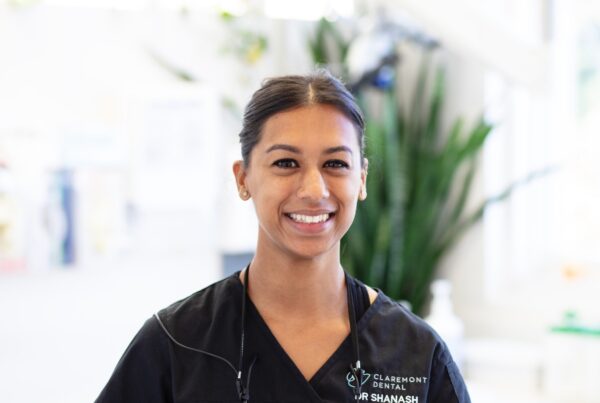Do you want a flexible workplace, where you can make a difference to the profession? Becoming a clinical tutor might be the role you have been searching for.
A quick flick through most of the UWA Dental School yearbooks will reveal that many graduates say they would like to come back to the Dental School one day as a clinical tutor. Clearly, it reflects the students’ respect for the dentists who have tutored and mentored them throughout their formative years at Dental School.
If it is a role you have wondered about, read on – the Dental School is on the lookout for experienced, passionate dentists who want to make a difference as clinical tutors. We spoke to the four student clinic coordinators – Drs Sally Beech, Josephine Drewett, Debbie Newport and Zarni Shakibaie about what to expect.
What is a clinical tutor?
Debbie explains that the clinical tutors are there to guide the students. “Clinical tutors play a vital role in supporting students through their clinical journey,” she says. “We complement and reinforce the theoretical knowledge they receive while providing practical insights and real-world experience.
“We have a range of student clinics including comprehensive care, extraction and emergency care, where the tutors supervise the students through the procedures.”
Who can be a clinical tutor?
“We are looking for well-rounded, experienced general practice clinicians willing to contribute their unique skills to student education,” Zarni says. “We also appreciate any specialists who are willing to lend their expertise. We aim to have specialists in Prosthodontics, Periodontics and Endodontics available for most if not all clinical sessions to support our tutors and students.”
“You also do not need to be a UWA graduate,” Josephine adds. “We welcome all clinicians who are registered to practice in Australia. “Most important is your enthusiasm for imparting the knowledge you have gained through your experiences as a clinician.”
A flexible job
A great thing about taking on a role as a clinical tutor that is you do not have to choose between tutoring and your private practice job – the role of a clinical tutor is very flexible. Tutors can select the number of days they wish and can choose from full days or morning (8am to 11.45am) or afternoon (12.30pm to 4.15pm) sessions.
Zarni has been a tutor intermittently since her eldest son was one year old (now 17). Being a mum of four teenagers, she appreciates the
job’s flexibility, allowing her to choose her schedule and easily find shift cover if needed. “It’s a really supportive team,” she says.
“I found it a great job when I returned to work after having children and I didn’t feel quite ready to take on a full day of private practice,” Sally adds. “Coming here and doing a shift was easy to fit around my daughters’ schedules, even when they were a few months old. It was great to be able to keep my brain working and have a professional outlet while I was taking time away from practice.”
“Many of our tutors find it a great way to step towards retirement,” says Josephine. “While you may be ready to cut back from the demands of private practice, this is a great way to still contribute in a really meaningful way.” There are also a few other options depending on availability, including opportunities at Sir Charles Gairdner Hospital for weekend emergencies and rural rotations throughout the year.
Benefits
Sally says aside from feeling you are giving back to the community; she feels the most significant benefit of being a tutor is her continued education. “I learn so much every time I come to the Dental School,” she says. “Private practice can be quite isolating, whereas when you come here, it is such as amazing team and there are so many incredible practitioners to learn from. The student cases can sometimes be quite complex, so I also learn from the multidisciplinary team that comes together to manage those patients.
“It also keeps you updated with the latest best practices in dentistry,” Sally adds. “The dedicated academic staff provide strong support, ensuring you feel confident in guiding the students.”
A rewarding experience
Zarni finds it highly rewarding to watch the students she taught progress from first to fourth year – witnessing their growth into competent clinicians who she hopes will positively impact the community. She feels a strong sense of achievement and values the rapport developed with students and staff, likening them to a “second family”.
“I get energy from the students because they are so enthusiastic about life and dentistry,” Josephine adds. “It inspires you on return to
your own clinical practice.”
“I have been tutoring for twenty years, and I have loved seeing students I taught come back as colleagues.”
A tutor’s perspective
Dr John Watson is known for wearing many hats in the dental community – one of those as a clinical tutor, to which he commits one full-day a week.
John says if you can carve out time to do it, tutoring is very worthwhile.
“You get a bit of a buzz when you see a light bulb go on in a student,” he says.
“The great thing about the current set-up is you can pick and choose sessions. It is easy to make space in your diary if you plan ahead. But what I find is you get more out of it if you do it regularly,” he adds. “If the dental students see you regularly, then they learn to trust your judgement and you get to know them better as well. You and the students get more out of it, so I would advocate for doing it regularly.
“It keeps your mind fresh because you are exposed to not just the young dentists who are training, but also the other tutors, and you chat about all sorts of things… even dentistry!” he laughs.
Remuneration and benefits include:
- A casual hourly rate remuneration plus superannuation
- Complimentary parking on the days that you tutor
- Professional indemnity cover while working as a tutor.
To express interest
To find out more information or to express interest in becoming a clinical tutor, email your CV and a cover letter to the clinical operations manager, Dr Michelle Huang at [email protected]


